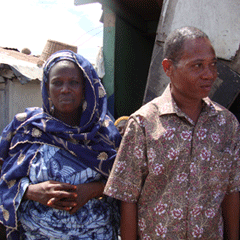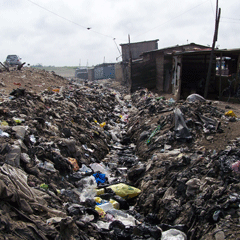[15 April 2013] -- Rampant population growth. Growing slums. Poor sanitation and worsening water services. Sprawling plush and expensive residential areas. Perennial flooding due to drainage problems. Bustling commercial activity. Horrendous traffic jams that grind the city to a halt. Residents who feel powerless and neglected by local government officials that are mostly appointed and not elected.
This is the situation in Accra, Ghana. The city is growing at a staggering rate; according to current trends, Accra’s population of 4 million will double in five years, making urban management a clear and inevitable priority. Yet, over the years national development in Ghana has been seen primarily through a rural lens, with little emphasis on urban issues—and growth has effectively outpaced urban planning.
But things are changing. In order to raise awareness of the urban agenda in Ghana, and Accra in particular, the Government of Ghana—in collaboration with the Cities Alliance and its partners including the World Bank, GIZ and AFD—have supported a major advocacy initiative aimed at generating debate in a constructive and inclusive way.
The initiative is the most coordinated advocacy on urban issues ever launched in Ghana using the power of broadcast media to capture the voices of the people, and it is already changing the urban dialogue in the country.
Fixing the Urban Mess
One of the main components of the advocacy initiative is a four-part series titled “Fixing the Urban Mess,” which aired on Ghana TV in 2012 as part of the Ghana Business Report programme produced by Channel Two Communications.
The videos document Accra’s urbanisation challenges from various perspectives:
-- Problems of governance, in which mayors and other local authorities are appointed rather than elected and thus accountable to the central government instead of the people
-- A tradition of civil society in Ghana that has left many people—especially the poor—without an understanding of their rights and responsibilities as citizens and also not being engaged by their governments in the day-to-day management of the cities
-- Planning problems, with an under-resourced planning department that lacks capacity to effectively plan for the city and relies on the national government to implement their recommendations.
-- Ever-expanding formal and informal settlements that have no basic services and that are impacting the city’s sanitation and drainage, making neighbourhoods vulnerable to destructive flooding year in and year out.
-- Severe traffic congestion that hampers mobility and economic growth.
The strategy was conceptualised by the World Bank Country Office in Ghana, which had been focusing on using communications to support operations since 2003, primarily in the area of sanitation. Their efforts were so successful—effectively jump-starting a major sanitation campaign—that a decision was made to scale up communications beyond sanitation and tackle Accra’s other major challenges, notably governance.
The World Bank Ghana team—Senior Communications Officer Kofi Tsikata, and Water & Sanitation Specialists Ventura Bengoechea and Emmanuel Nkrumah—worked closely with David Ampofo of Channel Two Communications and other partners to design a series of well-researched, compelling videos that would generate debate on Accra’s challenges in a constructive manner.
The Cities Alliance became involved in the process during the production stage. The initiative fit in well with the need identified by the Cities Alliance Country Programme partners in Ghana for more advocacy and awareness raising around cities and urban issues, and the Alliance provided funding for three of the four videos in the series and for a related radio programme titled “Our Cities” that airs every Wednesday on Ghana’s CitiFM.
In addition to Cities Alliance funding, Senior Urban Specialist Julian Baskin provided insights and expertise to the World Bank team to orient the series towards issues of the urban poor. Mr. Baskin was interviewed for the videos along with local consultant Sam Anyang-Kusi.
As a result, one of the key aspects at the centre of the videos was providing a voice for the poor. The team worked with People’s Dialogue—a community-based NGO and Cities Alliance partner that works closely with the Ghana Federation of the Urban Poor—to facilitate interviews with slum dwellers. This component was such a priority that funding for the video was explicitly linked to its inclusion of slum dwellers and their views.
Getting the Word Out
The videos, rolled out in 2012, have garnered very positive feedback from viewers, with many expressing how deeply moved they were by the programmes. The videos were complemented by the “Our Cities” radio programme as part of an integrated campaign addressing similar issues.
The World Bank team is making sure that the videos have as wide a viewership as possible and have distributed them widely to Ghanaian broadcasting networks. They have also sent copies to Ghana’s President John Mahama, the Ministry of Finance, local governments, development partners and other relevant stakeholders so they can see clearly what is happening and hear directly from the people.
Additionally, the team is taking the videos to Parliament and local councils, so that lawmakers and representatives can see the results of their actions, inactions and reactions from the people).
A large-scale multi-media dissemination approach has also spread the videos’ message through social media, online, and in leading newspapers. Plans are also underway to transcribe all the videos in the local languages and air them on the leading local radio station in Ghana.
A New Dialogue on Urban Development
The advocacy initiative is part of a larger process underway of changing the conversation in Ghana at all levels, and there are signs that political will is developing to address the mounting challenges of urbanisation.
There are indications that the National Government may be changing its position on the appointment of Mayors (called District Chief Executives in Ghana). This was a big issue cited by residents in interviews on the videos, and would represent a significant step towards making the local governments accountable to their constituents.
A debate has also opened up on the key issue of Sub-Sovereign bonds. Currently, only the National Government has permission to borrow on behalf of the nation, making it very difficult for struggling municipalities to get funding. A bill currently before Parliament would allow local governments to borrow directly, giving them more access to financing.
In addition, on 28 March 2013 President Mahama announced a National Urban Policy, the first comprehensive urban governance framework in Ghana’s history. The Deutsche Gesellschaft für Internationale Zusammenarbeit (GIZ), also a key partner in the Cities Alliance Country Programme in Ghana, provided technical and financial support for the development and launch of the policy.
“This is just the beginning,” said the World Bank’s Kofi Tsikata on changing the urban dialogue in Ghana. “There is much more to come.”

The Ghana advocacy initiative aims to give a voice to the urban poor, who feel powerless and neglected by their local governments. Photo: SDI
“This is the much-needed campaign to get everyone's attention on issues of urbanisation.” -- Sam Anyang-Kusi, consultant

With its fast-growing informal settlements, drainage is a major challenge for Accra. Photo: William Cobbett/Cities Alliance
Watch the Videos
Related Items




